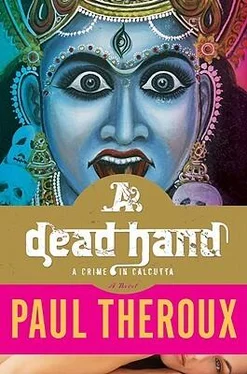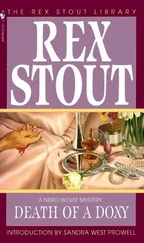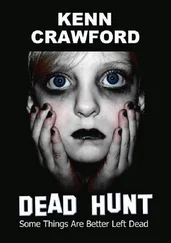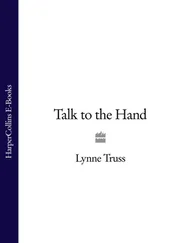What was strange about this was that Ma had the vaguely provincial English accent that well-educated Americans sometimes have, and as I mentioned, a put-on English turn of phrase. The words "thrusting" and "telly" and "artistic," which she'd pronounced autistic.
"They are a decaying family," she said. "You can see it in their faces. Inbred, lifeless, people without a point or purpose. I understand why royals are never jailed, why, when the time comes, they are lined up and shot."
"Mother upsets her London friends," Charlie said, his face gleaming in admiration.
"Because I speak the truth. I daresay, most of the British royal family are Germans."
While I smiled at "I daresay," Rajat laughed. He shrieked, "Germans!" Then he said, "Indians are just as false. Sonia Gandhi is Italian."
I pushed my breakfast aside and continued to write this down, delighted to have something for my notebook, glad to have something to do today. And when I was done I took the envelope that I had tucked into the pages. I opened the letter again and glanced through it. I come to India to oversee my charity. What did that mean? And what of the rest, the intrigue at the hotel? I tried to recall whether she had mentioned it over dinner. I remembered more of her rant about the royal family (a detail related to their TV watching), but very little about the letter, which was the reason I'd gone there in the first place. I wrote all that I remembered: Shall we drop it? She tended to the theatrical, but I loved her confidence, a certainty that enhanced her beauty.
I was glad to be relieved of the obligation to solve the crime. And the simple breakfast gave me a feeling of well-being. I lingered on the verandah reading the Statesman with my feet on a hassock. The tang of spices from the shop next door to the Hastings, the rattle and beep of cars jostling with pedicabs on the back lanes, the babble of human voices, mostly hawkers; the sense of life being lived outdoors, the city exposed. Ma had said she'd come to Calcutta for Durga Puja, but that had been months before, and this midwinter weather was perfect, warm days, chilly nights, an aroma of woodsmoke and burning charcoal in the city.
I resisted writing what I could barely put into words, that I'd met someone I liked, who seemed to know my mind, whom I hoped to go on knowing. A rare feeling in life, that one has made a friend. I am not thinking of a love affair, although that is the extreme example of such a feeling. I mean the desire to see a person again, the curiosity, the sense most of all that the person is a generous and vitalizing force — that I will be happier and stronger because of this friendship.
She had made me no promises. She'd said only, "Go to this spa" — had she said "spa"? — "you'll be glad you did." And I concluded that if I did it, obeying her, she would be pleased and want to see me again. She'd want to know how I liked it. She'd want to say See? I was right. You're glad you went.
She wanted to be right. I wanted to report to her that she'd been right. I wanted to obey her. And as on previous occasions in my life, I thought, not in words but in rising wavelets of feeling, like promises of health: If I don't see her again I'll be very disappointed. This eagerness, like a schoolboy crush, made me feel young and happy and a little silly. Out of the chaos and noise of Calcutta, the rejection, the indifference of the Indian mob, I'd found a purpose and someone to like.
I had made up my mind that she was exceptional — generous, motherly, flirtatious, kind, out of the ordinary. She seemed to know me. She seemed to care for me. And she was attractive. Ever since leaving her at the little restaurant — we left separately in taxis — I had begun to miss her.
All this was out of character for me. I am by nature suspicious and solitary, an eavesdropper not a buttonholer. The rich don't interest me, and for the rich, usually, people without money are of little account. I hate the way the rich cut corners. I can't stand their timidity. I hate their whining about the high cost of living or how little money they have, for the indirection of the rich is their incessant howl that they're poor.
But the new emotion in me, a nostalgia for attachment, made me feel better. I had the sense of unfamiliar sentiments being uncovered in me, like discovering a taste for a certain wine or a forgiveness for an old slight. I was thrilled to feel something new. It was knowledge, a surprise, and I was grateful because it came with a distinct optimism. Something new might be something to write about, another reason not to feel old.
"Your car is here, sir."
I looked up and saw the desk clerk, Ramesh Datta. What car? I hadn't ordered a car. I was reminded of the suddenness of the letter he'd brought me. I looked beyond the verandah and there it was, a black Ambassador with yellow curtains, an Indian in a white uniform standing next to it, awaiting orders. I hurried downstairs.
"You're looking for me?"
The man in uniform made a wing-flap of his arm and gave me a little salute. "Transport to Lodge, sir."
Another surprise, more pleasure, life becoming easier, the sort of thing one hopes for in India, usually in vain.
"My appointment's not until ten."
"I will wait, sir, and proceed at your pleasure."
"I appreciate that."
"Therefore I will bide my time," he said. "Cool heels."
That was another thing about India: the huge number of people whose job it was to stand and wait for those few who kept them waiting. Most were drivers, idle beside the car until the owner flashed into view and made an impatient gesture. But they were also door openers, secretaries, personal assistants, cooks, receptionists, every conceivable job description reduced to the level of flunky.
In my month of giving lectures in and around Calcutta I'd had to wait for people to show up — the sponsor, the audience, the person introducing me. And now I was someone for whom a flunky waited. This role did not suit me; it made me feel conspicuous and anxious, but I told myself that I had not asked for the car and driver.
"Who sent you?"
"Ma."
In all Indian legends, in every ancient narrative, the god or goddess has a vehicle. For Durga it is a lion, for Vishnu the eagle Garuda, for Shiva the bull. In this odd-looking pantheon Ganesh, the elephant god, rides on a mouse, Kali on a demon corpse. Ma had an Ambassador Nova with stringy curtains.
Chauffeur-driven cars rarely arrived at the Hotel Hastings, and when they did, they never lingered. For the first time since checking in I became an object of interest, not whispers but earnest glances. The staff seemed relieved. If I happened to be someone of substance, I might be a tipper. The ability to provide baksheesh was the principal determiner of a person's worth in India.
That chimed with the feeling within me that had surfaced this morning — that I was someone else today, not perhaps a whole new person but an aspect that had been slumbering inside me had been awakened, someone new to me. This smiling creature was sitting up and wagging his tail, open-mouthed and eager.
Still with a twitch of obligation, a sense that I wanted to please Ma, I put down my newspaper and went out to the car that was parked in the lane next to the hotel.
"You know where we're going?"
"Lodge, sir."
"What's your name?"
"Balraj, sir. Thank you, sir."
He swung open the door for me, then took his place at the wheel, jamming his peaked cap more firmly on his head. We were soon lost in traffic. I had not recognized the name of the spa — or lodge? I'd planned to show it to a taxi driver. I had a general idea of the main streets, but Balraj took side streets, back lanes, and alleys, jostling with bicycles, auto-rickshaws, and now and then hand-pulled rickshaws — as though wheeled off the pages of a Victorian print of old Calcutta, every detail intact. Barrows too, the ancient kind: I saw hairy legs and thick wooden spokes in wooden wheels. When the car slowed down people peered in the window at me, their faces pressed against the glass.
Читать дальше












